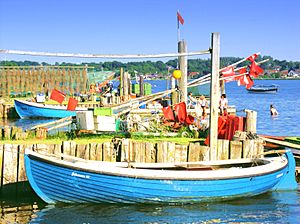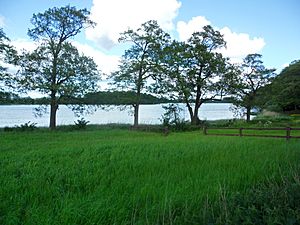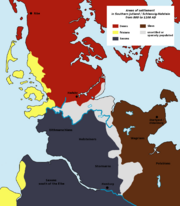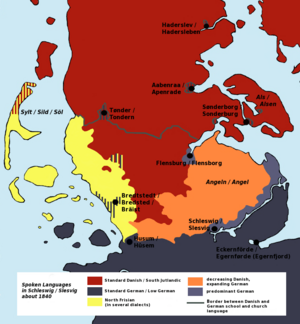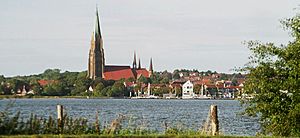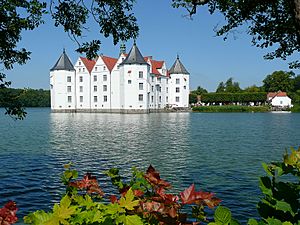Anglia (peninsula) facts for kids
Quick facts for kids
Anglia
Angeln, Angel
|
||
|---|---|---|
|
||
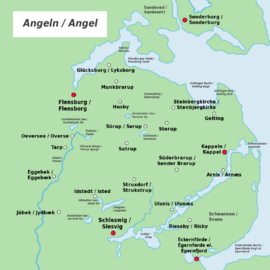 |
||
| Country | ||
| Largest towns | 1. Flensburg (Flensborg) 2. Schleswig (Slesvig) 3. Kappeln (Kappel) 4. Glücksburg (Lyksborg) 5. Mittelangeln (Midtangel) |
|
| Time zone | UTC+1 (CET) | |
| • Summer (DST) | UTC+2 (CEST) | |
Anglia (in German and Low German: Angeln; in Danish: Angel) is a small piece of land shaped like a finger, called a peninsula. It's located on the eastern coast of Jutland, which is a larger peninsula that includes most of Denmark and the northern part of Germany.
Anglia is part of a region called Southern Schleswig in the German state of Schleswig-Holstein. It sticks out into the Bay of Kiel in the Baltic Sea. To the south, a narrow water channel called the Sly Firth separates Anglia from another peninsula called Swania. To the north, the Flensburg Firth separates it from the Danish peninsula of Sundeved and the island of Als.
The land in Anglia is hilly and has many lakes. It's famous because it's believed to be the original home of the Angles. These were a Germanic group who moved to Great Britain a long time ago. Their new home was named after them, and that's how the name "England" came to be! So, the names "England" and "English language" actually come from this small area called Anglia.
Glücksburg Castle in the town of Glücksburg in northern Anglia is an important place. It's the home of the House of Schleswig-Holstein-Sonderburg-Glücksburg, which is the family that the King of the United Kingdom belongs to.
Contents
What's in a Name?
The German name Angeln might come from an old word meaning "narrow." This could refer to the narrow Sly Firth nearby. Another idea is that Angeln meant "hook," like a fishing hook. This would make sense because the peninsula is shaped a bit like a hook. It also suggests that the Angles might have been a fishing people.
Exploring Anglia's Geography
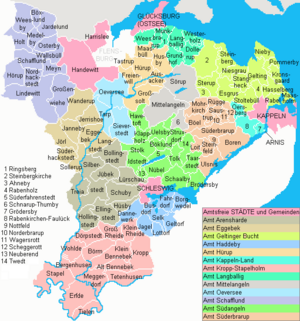
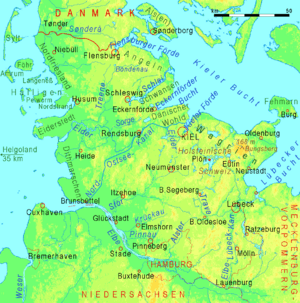
Anglia is one of four peninsulas along the Baltic Sea coast in Schleswig-Holstein. These peninsulas were formed by glaciers during the last ice age, which is why they are hilly and have many glacial lakes. The lakes in Anglia are known as the North Anglian Lake Group.
The River Treene starts in Anglia and flows towards the North Sea. It's the main river that flows into the River Eider. For a very long time, the Eider River was the southern border of the Danish kingdom. The northernmost tip of Anglia is a small peninsula called Holnis, which extends into the Flensburg Firth.
Most of Anglia belongs to the district of Schleswig-Flensburg. This district is mostly rural and has about 200,000 people. The city of Flensburg is a separate town, but it's also part of the Anglian Peninsula.
Languages Spoken in Anglia
Today, the main language in Anglia is German. However, people also speak Low German (also called Low Saxon). Low German is actually more similar to English than to regular German because it didn't go through some big sound changes that affected German.
For many centuries, from the 800s to the 1800s, Danish was the main language in Anglia. The type of Danish spoken here was called Anglian Danish, which was a dialect of South Jutlandic. But in the 19th century, more and more people started speaking Low German.
Even today, a small number of people in Anglia still speak Danish. These are special dialects of Standard Danish that have been influenced by German. The cities with the most Danish speakers are Flensburg, Schleswig, and Glücksburg.
You can still see the Danish influence in many place names in Anglia. For example, many towns end in -by (meaning "city"), like Nieby or Flensburg-Engelsby. Other names end in -rup (meaning "village"), like Sörup or Sterup. It's interesting to know that many places in England also have names ending in -by, like Derby or Rugby, because of the Angles and other groups who settled there long ago.
Anglia's History
The Early Angles
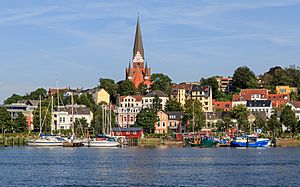
Anglia was once the home of the Germanic people known as the Angles. In the 5th and 6th centuries, some of these Angles, along with Saxons and Jutes, left their homeland. They traveled across the sea to the island of Great Britain.
According to old writings like the Anglo-Saxon Chronicle, a British king named Vortigern invited the Angles to come to Britain. He offered them land if they would help him fight against other groups. The Angles who went found good land and sent word back to their homeland. This led to many more Angles and other Germanic people moving to Britain.
A monk named Bede wrote a history around 730 AD. He said that the Angles came from a country called Anglia. He also mentioned that after they left, their original homeland was said to be empty. The Angles who moved to Britain became the ancestors of groups like the East Angles, Mercians, and Northumbrians. These groups formed the early English people.
Archaeological finds, like special brooches worn by people back then, also show that people from coastal Scandinavia, Denmark, and Schleswig-Holstein (including Anglia) settled in eastern and northern Britain.
Later History
After the Angles left Anglia, the region was settled by Danes by the 8th century. This is why so many place names in Anglia today end in -by, which means "city" in Danish. In the 10th century, the most important town in Anglia was Hedeby.
Later, Anglia became part of a larger region known as Southern Jutland or Schleswig. This area belonged to Denmark until the 19th century. In the countryside, people spoke a Danish dialect until the early 1800s, when Low German started to spread north. However, the towns had spoken Low German since the Middle Ages.
In 1864, Denmark lost Schleswig to Austria and Prussia after a war called the Second Schleswig War. After Germany lost the First World War in 1920, people in Schleswig voted to decide if they wanted to be part of Denmark again. As a result, the northern part of Schleswig went back to Denmark, but Anglia remained part of Germany. This whole story is part of what's known as the Schleswig-Holstein Question.
See also
 In Spanish: Angeln para niños
In Spanish: Angeln para niños
- Angles (tribe)
- Anglo-Saxons
- List of Germanic peoples
- Thorsberg moor



